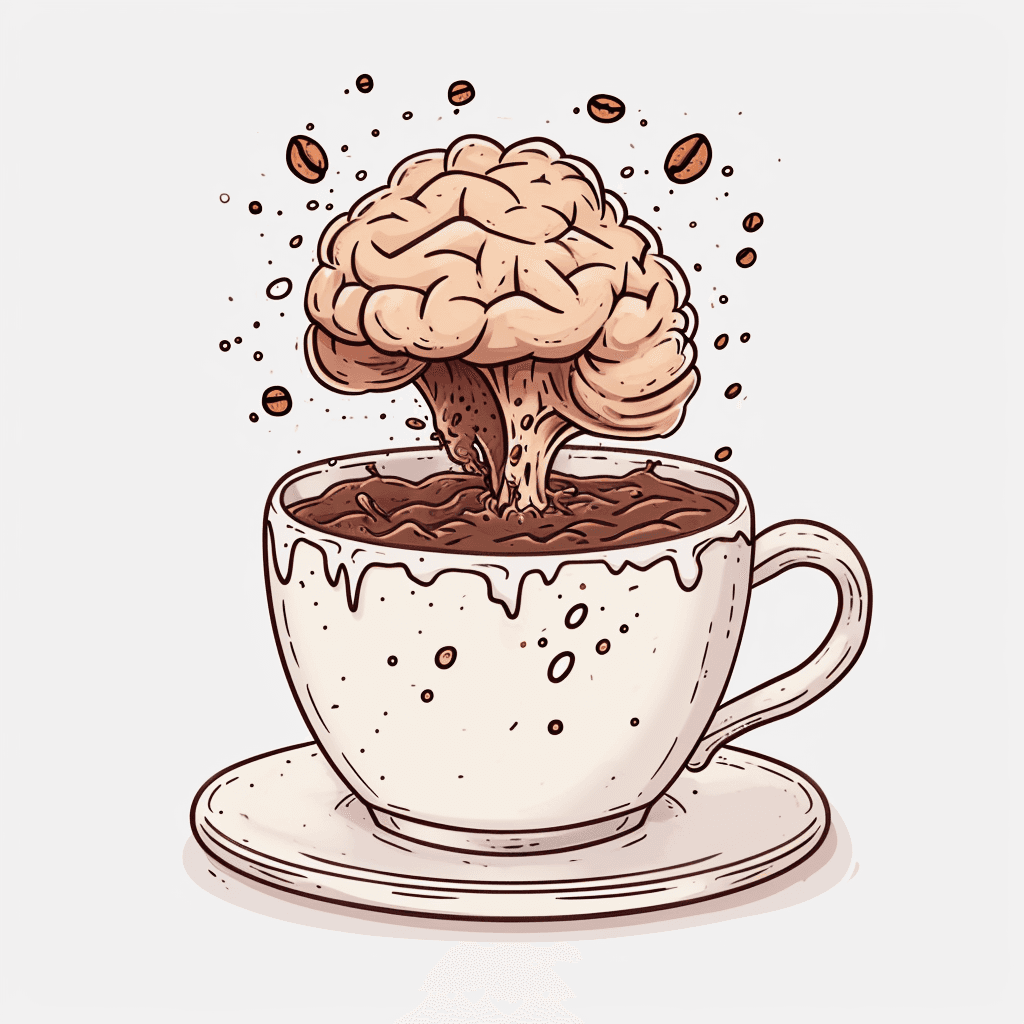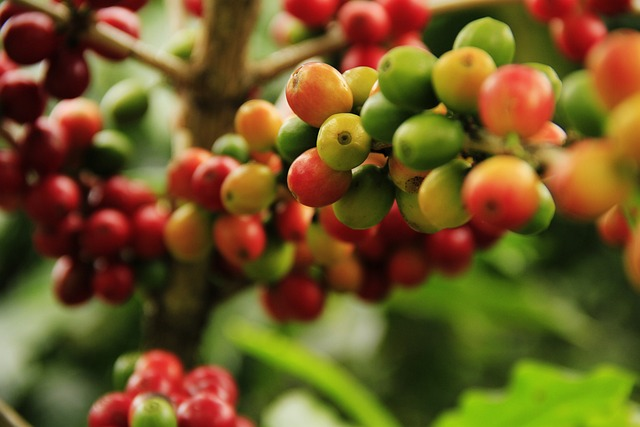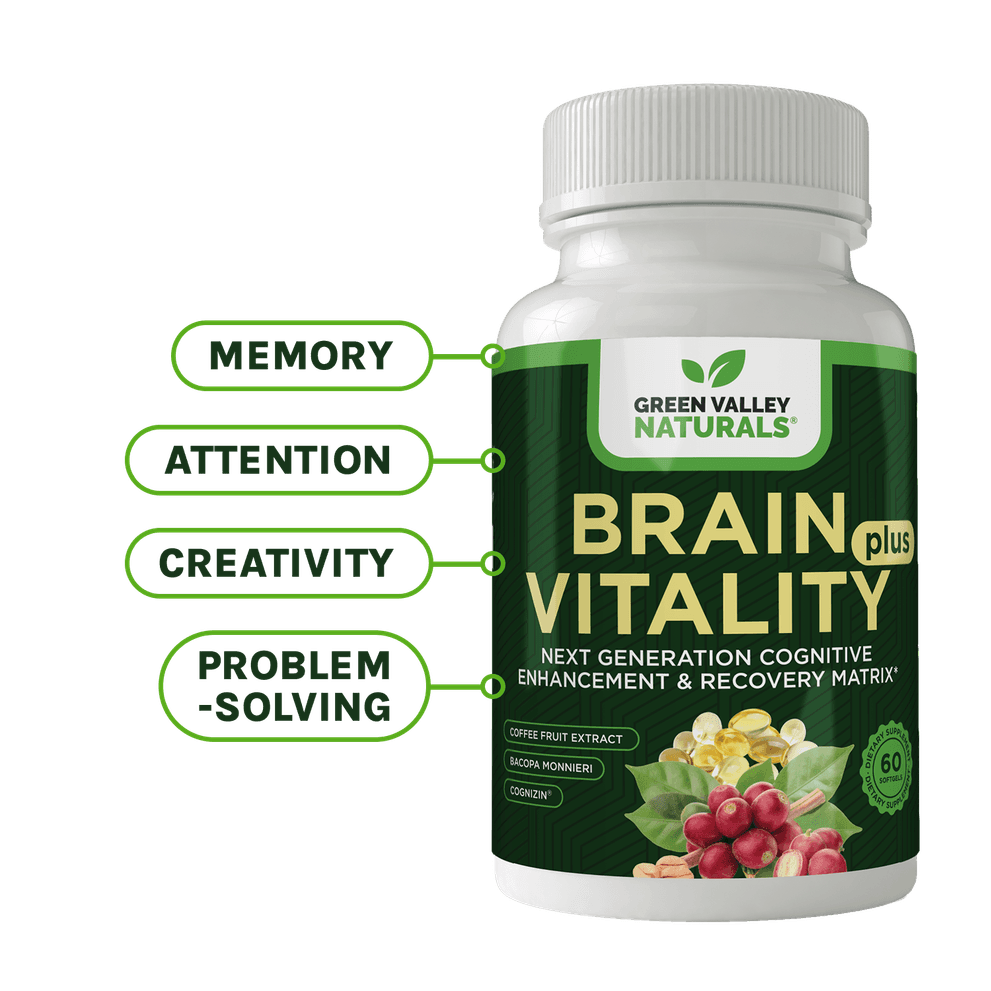
If you're like many people, you need a nice, hot cup of coffee in the morning to get your day started. One cuppa Joe can light a fire under your energy level and ignite clearer thinking. But what if you discovered that coffee holds another, even better secret for wiping away brain fog and promoting a sharp, clear memory?
We're talking about coffee fruit, a little-known part of the coffee plant with remarkable brain-boosting abilities. What's more, this forgotten fruit has given rise to the nutritional breakthrough NeuroFactor®, which can help you improve your brain performance, memory, and thinking.
Key Takeaways
- Coffee fruit, usually discarded during coffee production, offers surprising benefits for brain health. It's rich in antioxidants and nutrients that can boost brain-derived neurotrophic factor (BDNF), a protein crucial for neuron growth, survival, and communication. This translates to improved memory, learning, and protection against cognitive decline.
- Lifestyle modifications like exercise, quality sleep, and a healthy diet can also elevate BDNF levels. However, for those seeking a targeted approach to optimizing cognitive function and memory, there's the patented coffee fruit extract NeuroFactor®.
- NeuroFactor® increases BDNF by 143 percent in one hour, promoting sharper thinking and enhanced memory function. It's also free from dangerous side effects, making it a safe and effective option for supporting brain health.
What is Coffee Fruit Anyway?

Coffee fruit, also known as coffee cherry or coffee berry, is the fruit of the coffee plant. Yep, coffee plants (Coffea arabica) produce fruit. This small, round stone fruit is about the size of a grape and grows in bunches on the coffee plant.
Coffee fruit is typically small and green, turning a deep red or purple shade as it ripens. What about the coffee bean?
The coffee bean we all know and love is actually the seed inside the fruit. It's true, the beans you use for brewing your morning cup of coffee are the roasted seeds of the coffee fruit. While the fruit itself is traditionally discarded during the coffee-making process, research shows that it might be the most valuable part.
Coffee Fruit: The "Waste" From Coffee Roasting
The primary purpose of coffee production is to obtain the coffee beans, which are roasted and ground to make coffee. The fruit pulp surrounding the beans contains little to no caffeine and has a different flavor profile that's not typically desired in coffee.
In many coffee-producing regions, there has not been a traditional use for the coffee fruit. And because it's bulky and perishable, it's usually thrown away.
However, that's changing because coffee fruit has gained attention in the nutritional health industry due to its rich content of antioxidants, polyphenols, and other nutrients that are good for the body and great for the brain. In fact, its unique nutrient profile has shown coffee fruit is far healthier than coffee when it comes to your brain.
Does Coffee Rewire Your Brain?
The caffeine in coffee stimulates the central nervous system, increasing alertness and focus. It does this by blocking adenosine, a chemical that promotes sleepiness. Research suggests caffeine might enhance memory and learning, improving performance on cognitive tasks and aiding in memory consolidation.
Some studies indicate caffeine can influence brain plasticity—the brain's ability to change and adapt. One study showed caffeine may make some brain connections stronger in mice, but it's unclear if this applies to humans. However, excessive caffeine intake could hinder brain plasticity, especially from energy drinks.
Coffee Fruit and Caffeine
The biggest question we hear about coffee fruit is: Does it have caffeine? We're happy to report that coffee fruit contains significantly lower amounts of caffeine than the coffee bean.
The caffeine content of coffee fruit extract is approximately one to two percent. Most products with coffee fruit extract contain 5 to 20 mg of caffeine per serving, compared to ~96 mg in a regular coffee.
While coffee's main brain benefits come from caffeine, the coffee fruit provides the brain—and body—with nourishment, antioxidant protection, and nutrient-fueled energy.
Coffee Fruit Extract: The Hidden Gem For Clear Thinking and More

Coffee fruit extract is made only from the fruit of the coffee plant, not the beans. It contains little to no caffeine and instead is rich in antioxidants, including chlorogenic acid, rutin, and protocatechuic acid.
Studies have shown that coffee fruit extract can:
- Promote balanced blood pressure and heart health.
- Boost immune function and activate immune cells.
- Support a healthy weight thanks to chlorogenic acid content.
- Improve brain function by boosting BDNF levels, which protect neurons and enhance brain plasticity.
The Memory Saving Power of Brain Derived Neurotrophic Factor (BDNF)

BDNF promotes the growth, survival, and adaptation of brain cells. It fuels neurogenesis, protects neurons, enhances synaptic plasticity, and regulates neurotransmitters like serotonin and dopamine. Low levels of BDNF are linked with depression, anxiety, and memory loss.
Maintaining healthy BDNF levels is essential for clear thinking and memory. Unfortunately, BDNF declines with age, but higher levels are linked with lower dementia risk.
Clinical Study: High BDNF Levels Linked to Sharper Memory
A 2014 study in JAMA Neurology tracked 2,000 dementia-free adults for 10 years. Those with higher BDNF levels were significantly less likely to develop memory loss. Each increase in BDNF lowered dementia risk by 33 percent, especially in women and those over 80.
How to Boost Your BDNF

- Exercise intensely for 30 minutes, 4–5 times per week.
- Practice intermittent fasting or calorie restriction.
- Cut sugar and processed fats.
- Boost vitamin D levels.
- Get 7–8 hours of sleep nightly.
- Practice mindfulness or meditation to reduce stress.
- Get daily sunlight exposure.
- Use supplements like omega-3s, curcumin, and NeuroFactor®.
Why NeuroFactor®?
NeuroFactor® (also known as CognatiQ®) is a patented extract from whole coffee fruit that boosts BDNF by 143% in just one hour. It’s stimulant-free, safe, and highly effective for memory and focus. That’s why Green Valley Naturals includes it in Brain Vitality Plus.
Summary
Coffee fruit, often discarded, is a powerhouse for cognitive health. It boosts BDNF, protects neurons, and supports memory. Lifestyle changes can elevate BDNF, but NeuroFactor® provides a proven, concentrated boost. Consider exploring coffee fruit’s brain benefits for sharper memory and thinking.
Frequently Asked Questions
- What is NeuroFactor®? A patented, stimulant-free extract of coffee fruit clinically proven to raise BDNF.
- What does NeuroFactor® do? It boosts BDNF by 143% in one hour, improving memory and brain plasticity.
- What are the benefits of taking NeuroFactor®? Sharper memory, stronger neurons, better mood, and improved learning capacity.
- Are there side effects? No, NeuroFactor® is safe and free of dangerous side effects when produced under high-quality standards.
NeuroFactor® . Futureceuticals. https://www.futureceuticals.com/neurofactor
Robinson JL, Yanes JA, Reid MA, Murphy JE, Busler JN, Mumford PW, Young KC, Pietrzkowski ZJ, Nemzer BV, Hunter JM, Beck DT. Neurophysiological Effects of Whole Coffee Cherry Extract in Older Adults with Subjective Cognitive Impairment: A Randomized, Double-Blind, Placebo-Controlled, Cross-Over Pilot Study. Antioxidants (Basel). 2021 Jan 20;10(2):144. doi: 10.3390/antiox10020144. PMID: 33498314; PMCID: PMC7909261. https://pubmed.ncbi.nlm.nih.gov/33498314/
Erickson KI, Prakash RS, Voss MW, Chaddock L, Heo S, McLaren M, Pence BD, Martin SA, Vieira VJ, Woods JA, McAuley E, Kramer AF. Brain-derived neurotrophic factor is associated with age-related decline in hippocampal volume. J Neurosci. 2010 Apr 14;30(15):5368-75. doi: 10.1523/JNEUROSCI.6251-09.2010. PMID: 20392958; PMCID: PMC3069644. https://pubmed.ncbi.nlm.nih.gov/20392958/
Jackson PA, Kenney C, Forster J, Smith EF, Elcoate R, Spittlehouse B, Johnson J, Kennedy DO. Acute Cognitive Performance and Mood Effects of Coffeeberry Extract: A Randomized, Double Blind, Placebo-Controlled Crossover Study in Healthy Humans. Nutrients. 2023 May 23;15(11):2418. doi: 10.3390/nu15112418. PMID: 37299382; PMCID: PMC10254646. https://pubmed.ncbi.nlm.nih.gov/37299382/
Erickson KI, Voss MW, Prakash RS, Basak C, Szabo A, Chaddock L, Kim JS, Heo S, Alves H, White SM, Wojcicki TR, Mailey E, Vieira VJ, Martin SA, Pence BD, Woods JA, McAuley E, Kramer AF. Exercise training increases size of hippocampus and improves memory. Proc Natl Acad Sci U S A. 2011 Feb 15;108(7):3017-22. doi: 10.1073/pnas.1015950108. Epub 2011 Jan 31. PMID: 21282661; PMCID: PMC3041121. http://www.ncbi.nlm.nih.gov/pubmed/21282661
Mattson MP. Energy intake, meal frequency, and health: a neurobiological perspective. Annu Rev Nutr. 2005;25:237-60. doi: 10.1146/annurev.nutr.25.050304.092526. PMID: 16011467. http://www.ncbi.nlm.nih.gov/pubmed/16011467
Molteni R, Barnard RJ, Ying Z, Roberts CK, Gómez-Pinilla F. A high-fat, refined sugar diet reduces hippocampal brain-derived neurotrophic factor, neuronal plasticity, and learning. Neuroscience. 2002;112(4):803-14. doi: 10.1016/s0306-4522(02)00123-9. PMID: 12088740. http://www.ncbi.nlm.nih.gov/pubmed/12088740
Molendijk ML, Haffmans JP, Bus BA, Spinhoven P, Penninx BW, Prickaerts J, Oude Voshaar RC, Elzinga BM. Serum BDNF concentrations show strong seasonal variation and correlations with the amount of ambient sunlight. PLoS One. 2012;7(11):e48046. doi: 10.1371/journal.pone.0048046. Epub 2012 Nov 2. PMID: 23133609; PMCID: PMC3487856. http://www.ncbi.nlm.nih.gov/pmc/articles/PMC3487856/
Liu D, Wang Z, Gao Z, Xie K, Zhang Q, Jiang H, Pang Q. Effects of curcumin on learning and memory deficits, BDNF, and ERK protein expression in rats exposed to chronic unpredictable stress. Behav Brain Res. 2014 Sep 1;271:116-21. doi: 10.1016/j.bbr.2014.05.068. Epub 2014 Jun 8. PMID: 24914461. http://www.ncbi.nlm.nih.gov/pubmed/24914461
Nam SM, Choi JH, Yoo DY, Kim W, Jung HY, Kim JW, Yoo M, Lee S, Kim CJ, Yoon YS, Hwang IK. Effects of curcumin (Curcuma longa) on learning and spatial memory as well as cell proliferation and neuroblast differentiation in adult and aged mice by upregulating brain-derived neurotrophic factor and CREB signaling. J Med Food. 2014 Jun;17(6):641-9. doi: 10.1089/jmf.2013.2965. Epub 2014 Apr 8. PMID: 24712702; PMCID: PMC4060834. http://www.ncbi.nlm.nih.gov/pubmed/24712702
Gundimeda U, McNeill TH, Fan TK, Deng R, Rayudu D, Chen Z, Cadenas E, Gopalakrishna R. Green tea catechins potentiate the neuritogenic action of brain-derived neurotrophic factor: role of 67-kDa laminin receptor and hydrogen peroxide. Biochem Biophys Res Commun. 2014 Feb 28;445(1):218-24. doi: 10.1016/j.bbrc.2014.01.166. Epub 2014 Feb 4. PMID: 24508265. http://www.ncbi.nlm.nih.gov/pubmed/24508265
Wu A, Ying Z, Gomez-Pinilla F. Dietary omega-3 fatty acids normalize BDNF levels, reduce oxidative damage, and counteract learning disability after traumatic brain injury in rats. J Neurotrauma. 2004 Oct;21(10):1457-67. doi: 10.1089/neu.2004.21.1457. PMID: 15672635. http://www.ncbi.nlm.nih.gov/pubmed/15672635
Rahvar M, Nikseresht M, Shafiee SM, Naghibalhossaini F, Rasti M, Panjehshahin MR, Owji AA. Effect of oral resveratrol on the BDNF gene expression in the hippocampus of the rat brain. Neurochem Res. 2011 May;36(5):761-5. doi: 10.1007/s11064-010-0396-8. Epub 2011 Jan 9. PMID: 21221775. http://www.ncbi.nlm.nih.gov/pubmed/21221775




